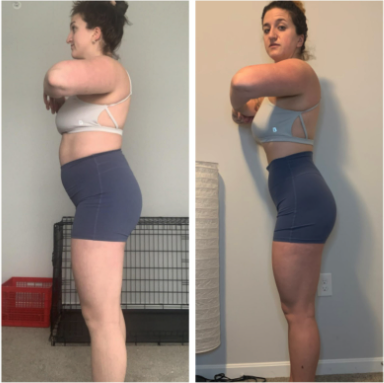
Many women who come to me experiencing fat loss resistance and digestive issues have some hormone dysfunction playing a role under the surface. It's why all our clients receive a comprehensive hormone panel and action plan as part of their coaching. We cannot identify the issue solely on symptoms alone, so we test and don't guess.
I want to dive into the two most common hormone issues we discover when addressing a client's bloating and digestive irregularity with ways to address it.
Note: Blood work and additional testing must be done to determine where the issue originates.
Estrogen Dominance
Estrogen dominance is the most common hormone issue in almost every woman we work with. We have worked with maybe five women out of the now 1,000+ who did not have estrogen dominance. It is extremely prevalent.
RECENT: Low Hanging Fruit to Improve Digestion and Eliminate Bloating
Estrogen dominance occurs when there is an overproduction of estrogen, poor metabolization of estrogen in the liver, and/or a dysfunctional relationship to progesterone.
It can look like this:
- High Estrogen - Normal Progesterone
- High Estrogen - Low Progesterone
- Normal Estrogen - Low Progesterone
What are some of the symptoms of estrogen dominance?
- Weight Gain
- Bloating
- Anxiety
- Extreme PMS
- Constipation
- Low Libido
- Trouble Sleeping
- Migraines
- Fatigue
- Ovulation Pain - Cysts
- Breast Tenderness
- Hair Loss
- Acne
- Low Thyroid Function
- Infertility
- And more...
How does a woman develop estrogen dominance?
Chronic Exposure to Xenoestrogens
Xenoestrogens are a type of xenohormone that imitates estrogen.
- Birth Control
- Plastics
- Pollution
- Pesticides
- Parabens/Sulfates
Excessive Consumption of Phytoestrogens
Plant-based foods like soy or highly processed foods.
High Stress
When cortisol (stress) skyrockets, it will tank progesterone over time (this is nicknamed the cortisol steal.)
How To Address Estrogen Dominance To Reduce Bloating?
Limit Your Exposure to Xenoestrogens and Consumption of Phytoestrogens:
- Consult your physician to learn more about non-hormonal birth control methods
- Limit BPA plastic use
- Drink filtered water (not tap)
- Consume whole foods 80% of the time
- Wash all veggies/fruits and buy organic when possible
- Buy grass-fed and pasture-raised meats
- Use natural lotions, wash, deodorants, and makeup products
- Moderate processed food and soy intake
Practice Stress Management:
Ensure that proper self-care, time off, boundary setting, emotional regulation, and healthy environments are taking place. Our stress is our responsibility.
Potential Supplementation:
Diindolylmethane (DIM) is made in the body from a chemical called indole-3-carbinol. It's found in cruciferous vegetables such as cauliflower and broccoli. It can be taken as a supplement as well. DIM promotes healthy estrogen metabolism.
Chasteberry/Vitex is an agnus-castus fruit known as chasteberry or monk's pepper. It helps promote healthy progesterone levels. However, it is not recommended for women diagnosed with PCOS.
Hypothyroidism
The second most common hormone issue we see is hypothyroidism. Hypothyroidism is when your thyroid hormone does not secrete enough thyroid hormone. It slows down and dysregulates digestion.
Hypothyroidism occurs when the pituitary and the thyroid gland are not communicating properly, or there is some dysfunction of the pathway.
What are some of the symptoms of hypothyroidism?
- Weight Gain
- Constipation
- Fatigue
- Sensitivity To Cold
- Brain Fog
- Hair Loss
- Dry Skin
- Extreme PMS Symptoms
- High Cholesterol
- Brittle Nails
- Spotting
How can a woman develop hypothyroidism?
Genetics
Hashimoto's disease is an autoimmune disorder. It's usually genetic but can also be influenced by environmental factors, like we talked about above.
High Stress
Isn't it weird how stress keeps popping up? High cortisol negatively impacts the conversion of T4 to T3 by raising RT3 levels, leading to a sluggish thyroid.
Chronic Low-Calorie Diets
Eating 1,200-calorie diets repeatedly wreaks havoc on your thyroid (metabolism). This is why every time you try to "diet" it gets harder and harder until, eventually, your thyroid has had enough.
How To Address Hypothyroidism To Reduce Bloating
Consult a Professional:
Hypothyroidism is a diagnosed condition. Again, test, don't guess. Sometimes medication IS NECESSARY. And that is okay.
REPEAT - Practice Stress Management:
Ensure that proper self-care, time off, boundary setting, emotional regulation, and healthy environments are taking place.
Stop Undereating:
Continuing to undereat will only make matters worse. You will most likely need to eat at maintenance level calories for the next few years. Yes years. Stop dieting!
Potential Supplementation:
Minerals To Support the Thyroid Gland: Magnesium, Selenium, Iodine, Zinc, Copper, Iron, and Boron.
Thyroid Glandular: Naturally desiccated thyroid gland (usually bovine) to help support T4 & T3 production.
Note: Always consult a professional before starting a glandular protocol.
Client Case
I want to share a client case in which hormone issues were taking place, negatively impacting her body composition, digestion, and overall how she felt.
Rachel met her goals by following a sustainable nutrition protocol, keeping stress low, and addressing her hormone dysfunction through supplementation!
Realize this transformation did not happen overnight! Rachel also worked with a functional health practitioner alongside myself and my team.

Recap
Digestion issues can be tricky because there are multiple variables at play.
Don't look at digestion through a fixed lens. Remember, we are working with humans, not robots. Even the best protocols will not work if the client has a major life event or is mentally struggling.
Next month, we will dive into common food intolerances that cause gut dysfunction and bloating with ways to address the dysfunction.
Alycia Israel is a nationally qualified NPC figure and bikini competitor and raw powerlifter. She has a master’s degree in exercise physiology, is an NSCA-certified strength and conditioning specialist, and an ISSN-certified sports nutritionist. As the former personal training coordinator at Ohio State University for seven years, she currently owns and operates Alycia's Barbell, an online training and nutrition business that helps clients lose fat for life or jump on the competitive bodybuilding stage. She can be contacted at alyciafit@gmail.com.










